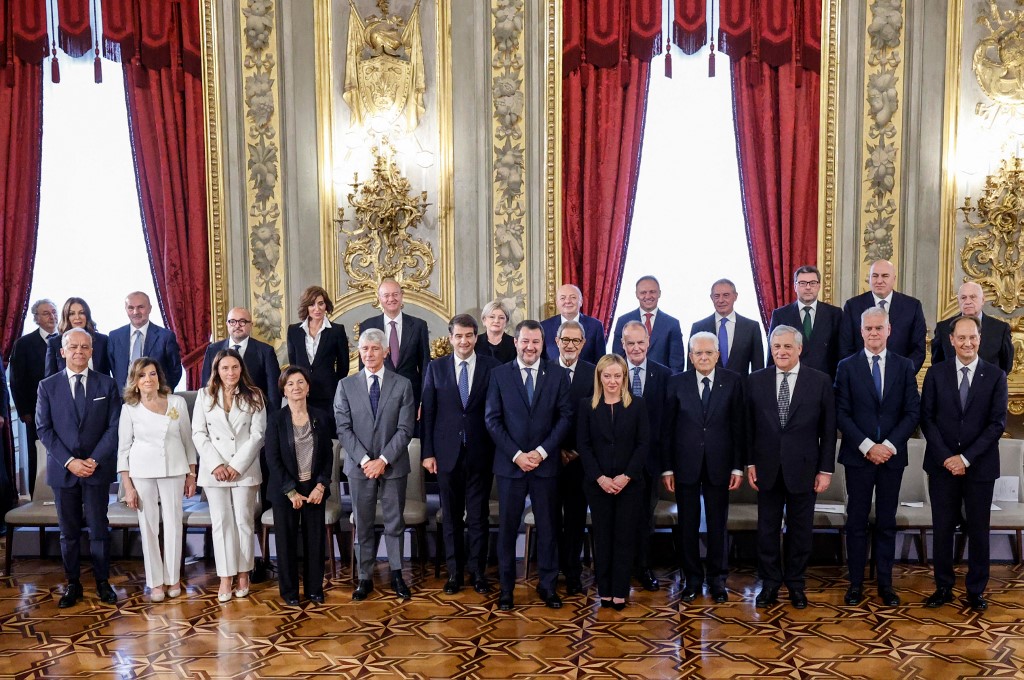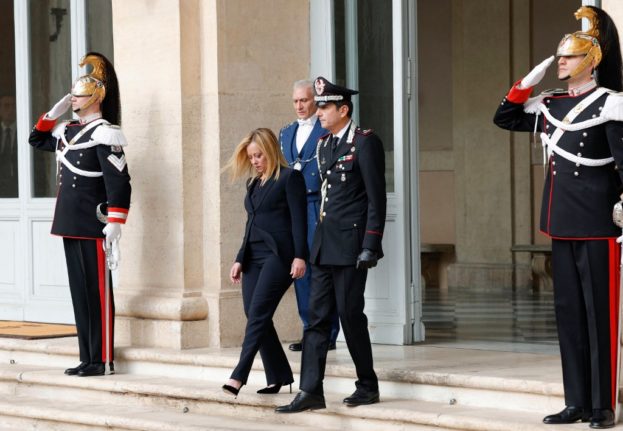Meloni took the oath before President Sergio Mattarella at the Quirinal Palace in Rome, once home to popes and kings of Italy.
Her post-fascist Brothers of Italy party — Eurosceptic and anti-immigration — won the 25th September legislative polls but needed outside support to form a government.
Meloni’s appointment is an historic event for the eurozone’s third largest economy and for Brothers of Italy, which has never been in government.
Giuramento del nuovo Governo. Seguiteci in diretta: https://t.co/2JnqHVFDCv pic.twitter.com/TFy16u7bca
— Giorgia Meloni 🇮🇹 ن (@GiorgiaMeloni) October 22, 2022
It won 26 percent of the vote last month, compared to eight and nine percent respectively for her allies Forza Italia and the far-right League.
Meloni’s list of 24 ministers, including six women, revealed a desire to reassure Italy’s partners. She named Giancarlo Giorgetti as economy minister, who served under the previous government of Mario Draghi.
READ ALSO: What will the right-wing election victory mean for abortion rights in Italy?
Giorgetti, a former minister of economic development, is considered one of the more moderate, pro-Europe members of Matteo Salvini’s League.
Meloni also named ex-European Parliament president Antonio Tajani, of Forza Italia, as foreign minister and deputy prime minister.
Salvini will serve as deputy prime minister and minister of infrastructure and transport. That appointment is likely to disappoint Salvini, who wanted Meloni to give him the role of interior minister again after he previously held the post between 2018 and 2019. The position went instead to a technocrat, Rome prefect Matteo Piantedosi.
A formal ceremony for the handover of power from Draghi to Meloni will take place on Sunday before the premier leads the first cabinet meeting.

European Commission chief Ursula von der Leyen congratulated Meloni on her appointment.
“I count on and look forward to constructive cooperation with the new government on the challenges we face together,” she tweeted on Saturday, while European Parliament speaker Roberta Metsola tweeted in Italian that “Europe needs Italy”.
Congratulazioni @GiorgiaMeloni, la prima donna Premier in Italia.
L’Europa sta affrontando enormi sfide. Aiutiamo i nostri cittadini e sosteniamo l’Ucraina rimanendo uniti e determinati.
L’Europa ha bisogno dell’Italia. Insieme supereremo ogni difficoltà.
Buon lavoro!
🇪🇺🇮🇹
— Roberta Metsola (@EP_President) October 22, 2022
US President Joe Biden congratulated Meloni and called Italy a “vital NATO ally and close partner.”
Ukrainian President Volodymyr Zelensky tweeted that he looked “forward to continued fruitful cooperation to ensure peace and prosperity in Ukraine, Italy and the world”.
My congratulations to @GiorgiaMeloni, the first female Prime Minister of Italy. I wish the new government to successfully respond to all the challenges of today. I look forward to continued fruitful cooperation to ensure peace and prosperity in Ukraine, Italy and the world!
— Володимир Зеленський (@ZelenskyyUa) October 22, 2022
Hungarian Prime Minister Viktor Orban also sent his congratulations on Twitter. “Big day for the European Right!” he wrote.
Congratulations @GiorgiaMeloni on the formation of your government! Big day for the European Right! pic.twitter.com/QrSElfV5KI
— Orbán Viktor (@PM_ViktorOrban) October 22, 2022
Unity concerns
The consultations to cobble together a government had been overshadowed by disagreements with her two would-be coalition partners over Meloni’s ardent support for Ukraine since the Russian invasion, whereas the leaders of Forza Italia and the League are both considered close to Moscow.
A recording was leaked in which Italy’s former prime minister Silvio Berlusconi — who heads Forza Italia — talks about his warm ties with Moscow and appeared to blame the war in Ukraine on Zelensky. Berlusconi says the comments were taken out of context.
Salvini is a long-time fan of Russian President Vladimir Putin and has criticised Western sanctions on Russia. Despite her Eurosceptic stance, Meloni has been firm about her support for Ukraine, in line with the rest of the European Union and the United States.
But the tensions add to concerns that Meloni’s coalition, held together by the need for a parliamentary majority, will struggle to maintain unity.
Challenges ahead
Meloni’s coalition wants to renegotiate Italy’s portion of the EU’s post-Covid recovery fund. It argues the almost 200 billion euros ($197 billion) it expects to receive should take into account the current energy crisis, exacerbated by Moscow’s invasion of Ukraine, which has hit supplies of Russian gas to Europe.
But the funds are tied to a series of reforms only just begun by Draghi’s government, and analysts say Meloni has limited room for manoeuvre.
Meloni had campaigned on a platform of “God, country and family”, sparking fears of a regression on rights in the Catholic-majority country.



 Please whitelist us to continue reading.
Please whitelist us to continue reading.
Member comments